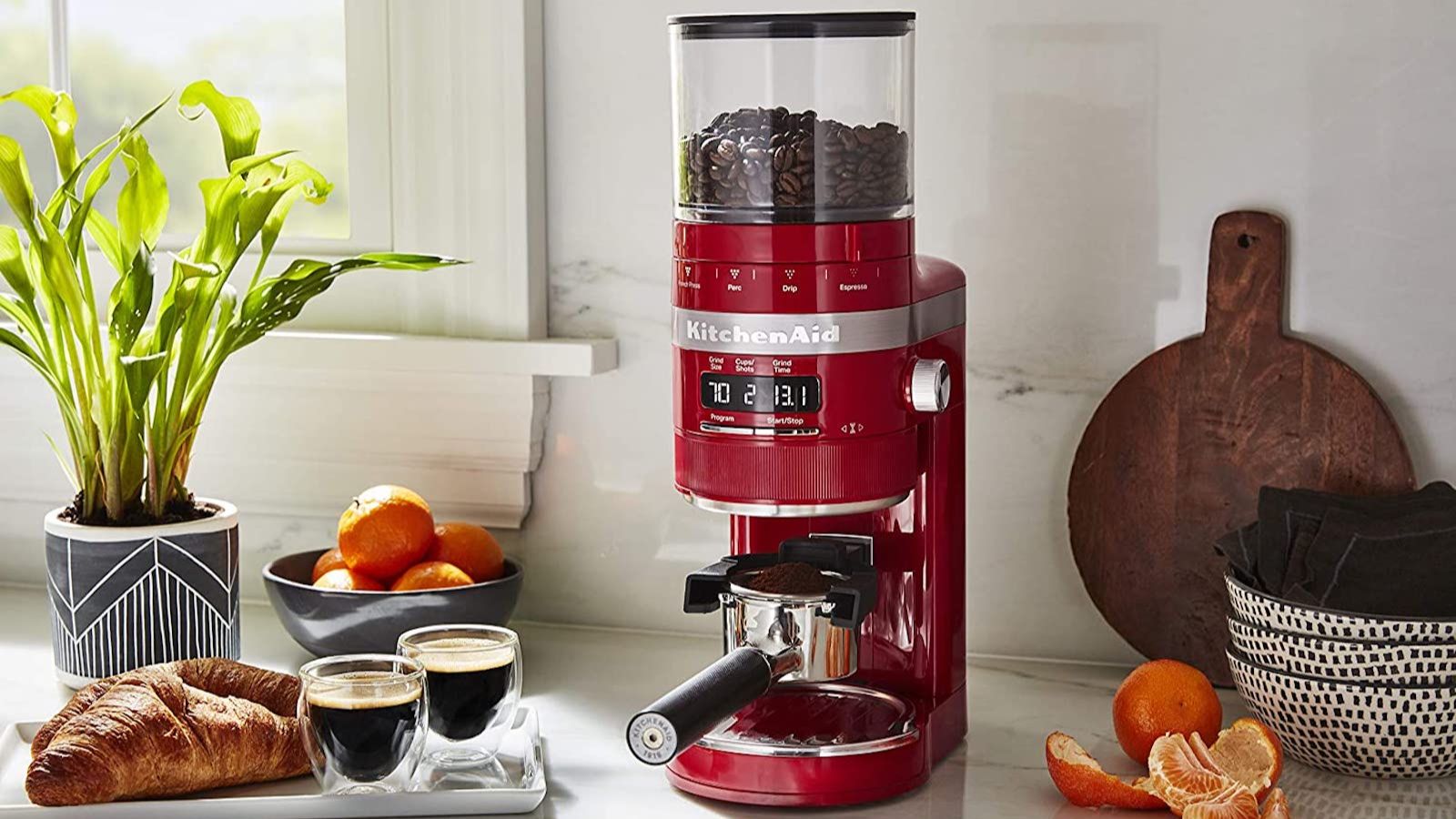
I’m beginning to put KitchenAid in the same category as Moccamaster, De’Longhi, and Breville for their coffee products. Whilst they might be best known for their iconic stand mixers, it’s about time we all got to know them for their incredible coffee grinders and coffee makers. I haven’t tested any KitchenAid coffee product that’s been anything short of perfect.
However, I wanted to make sure that their products were quality across their coffee range. I'd already heard great things about the burr grinder before testing it. I've spoken to plenty of other expert testers who already rank the KitchenAid grinder among the best coffee grinders and even use it in their own homes. When the experts start adding appliances to their home collections, that’s when you know that they’re really, genuinely good, so I wanted to make sure it lived up to such a high bar.
After testing it across a range of functions, I can officially tell you that the KitchenAid burr grinder is outstanding. It’s easy to achieve perfect results whether you’re a coffee novice or more of an expert. Every feature sets you up for success. I love it.
Specifications
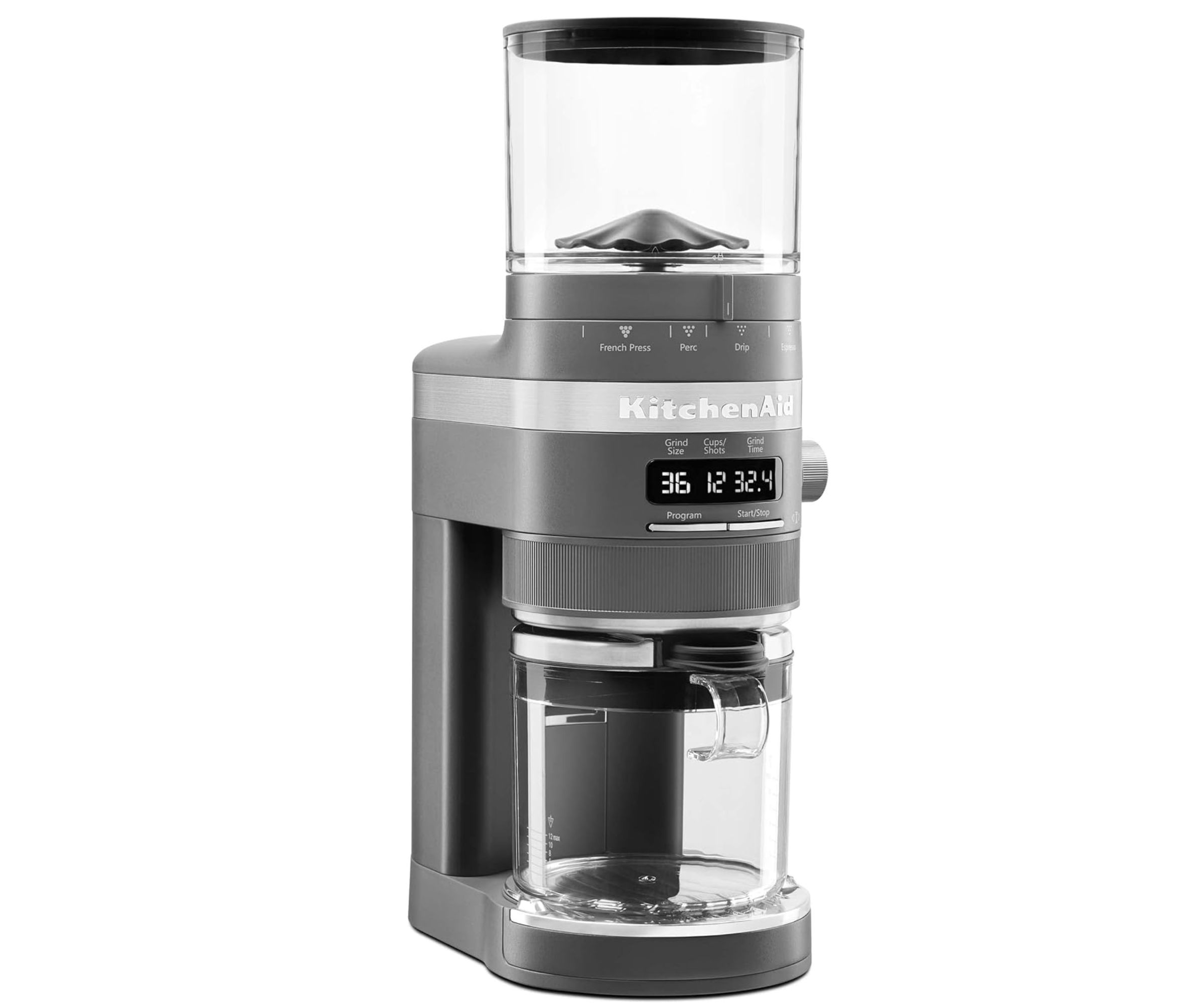
Unboxing
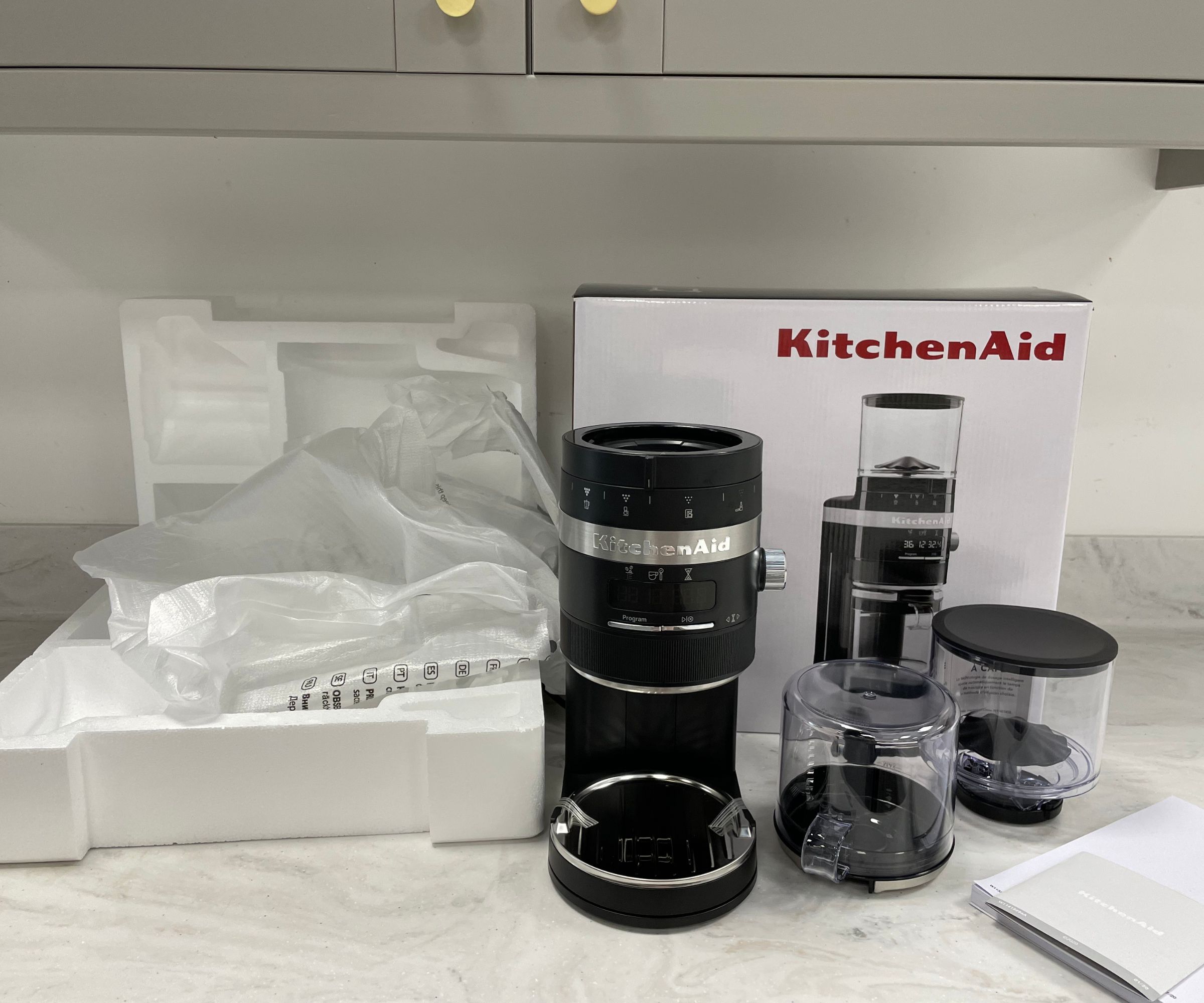
I have mixed feelings about the whole unboxing process for the KitchenAid. Most of my experience was good, if not exceptional. The box is sturdy, the grinder looked great on the countertop, and it was easy to set up. The hopper clicked satisfyingly into place and the airtight grounds container also slotted tightly underneath the grounds dispenser. Every part was distinctly different, but simplified so that even a beginner could set this up without any instructions at all.
However, all is that this came surrounded by plastic and polystyrene, neither of which is recyclable. There’s very little else that the KitchenAid falls short on.
Who would it suit?
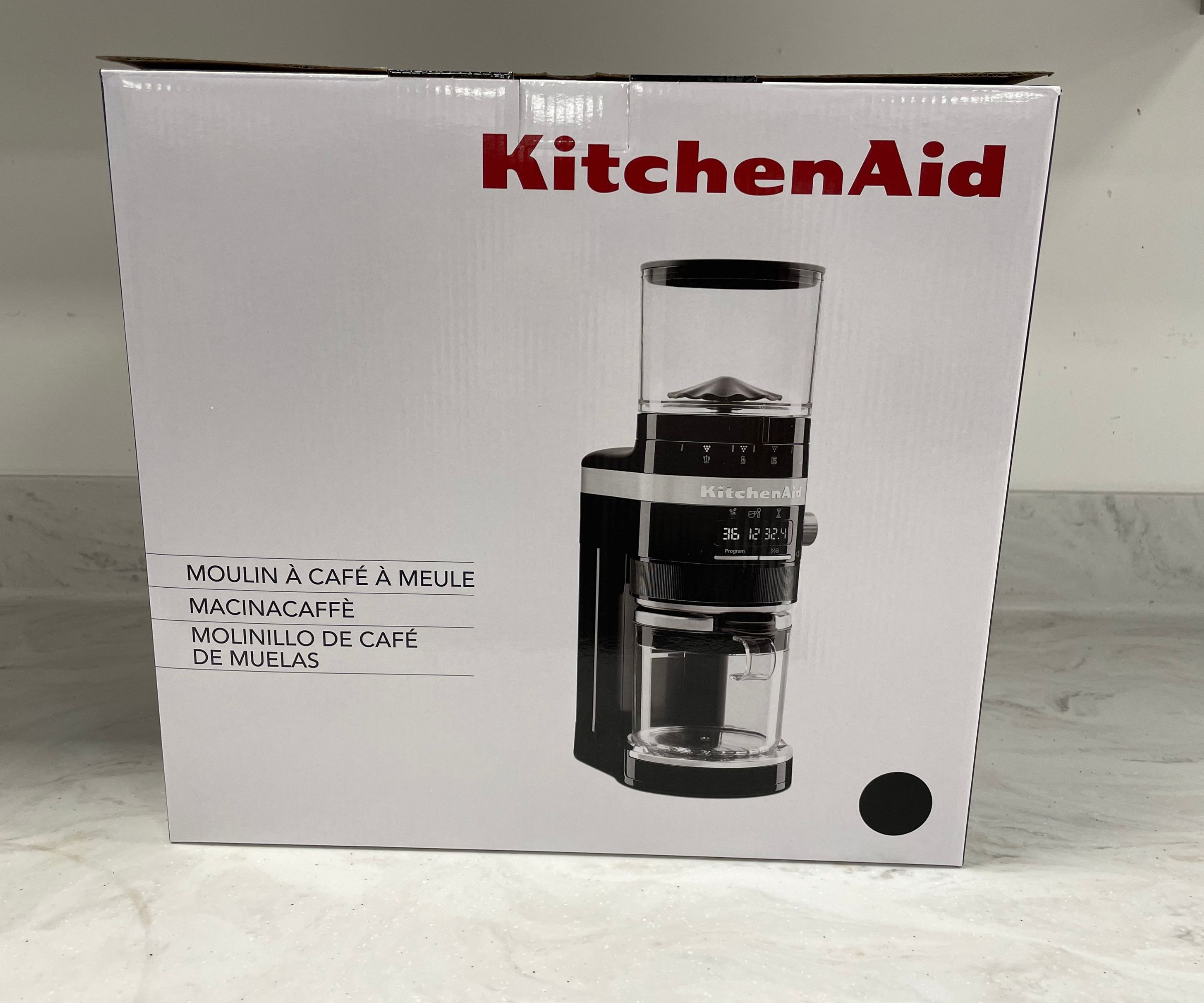
This grinder is available in a range of colors, designed to suit various kitchens, and the LED controls can do enough to protect a beginner from messing up their grinding, whilst offering precision for the more advanced coffee drinker. I think it satisfies a large portion of the coffee grinder market.
The only people who this might not suit are those who are short on space. The Kitchenaid has a large footprint, so if your countertops are really compact, you might need to look for an alternative option. It’s also quite expensive, probably because it can do so much. If you’re shopping for a very basic model and you’re on a tight budget, you’ll also want to check out some more simple alternatives.
What is it like to use?
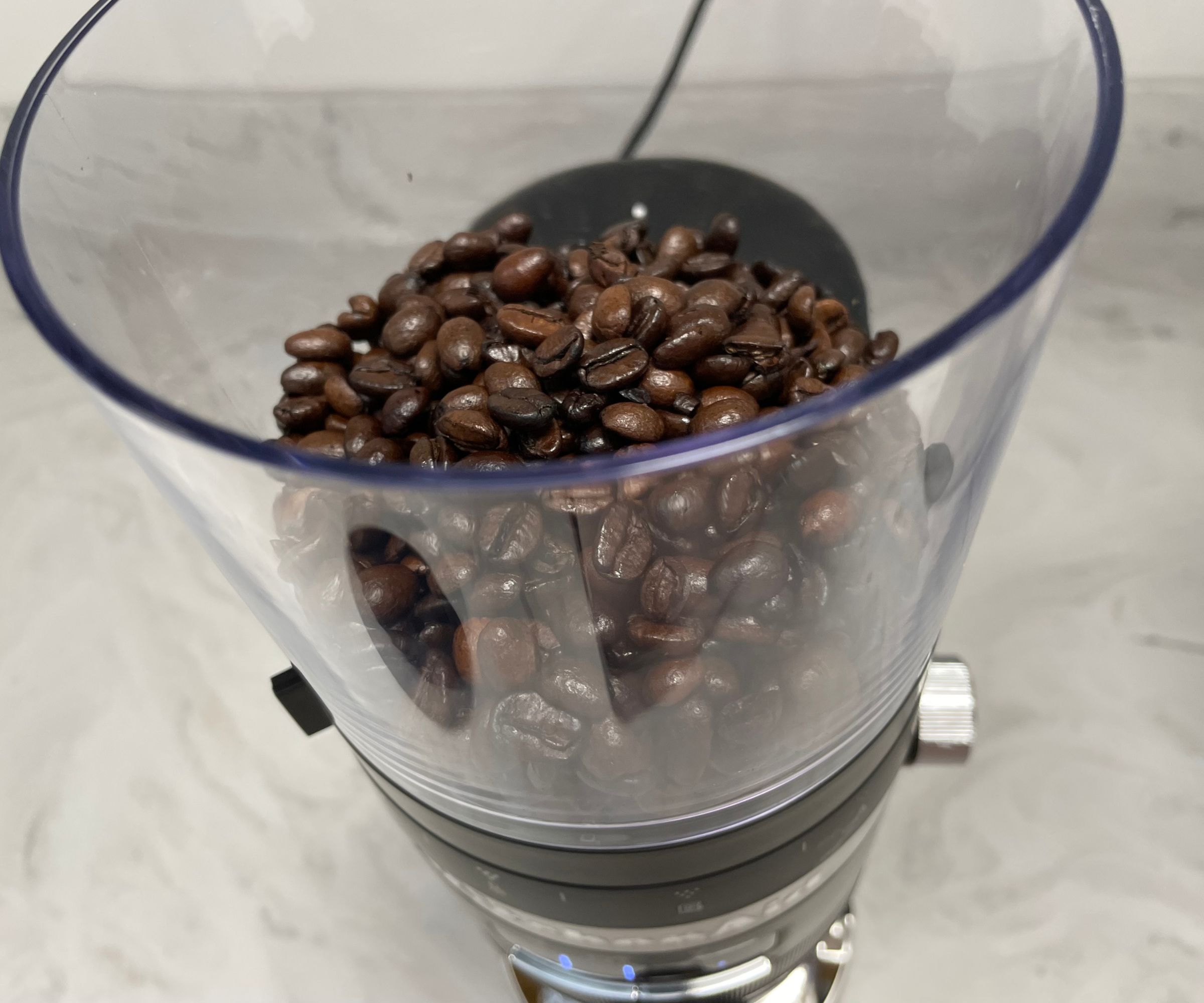
As you might expect from everything that I’ve said so far, this is a breeze to use. The LED display clearly breaks down settings, dose, and grind times. You can adjust these using the dial and buttons.
Test 1: Fine grinds
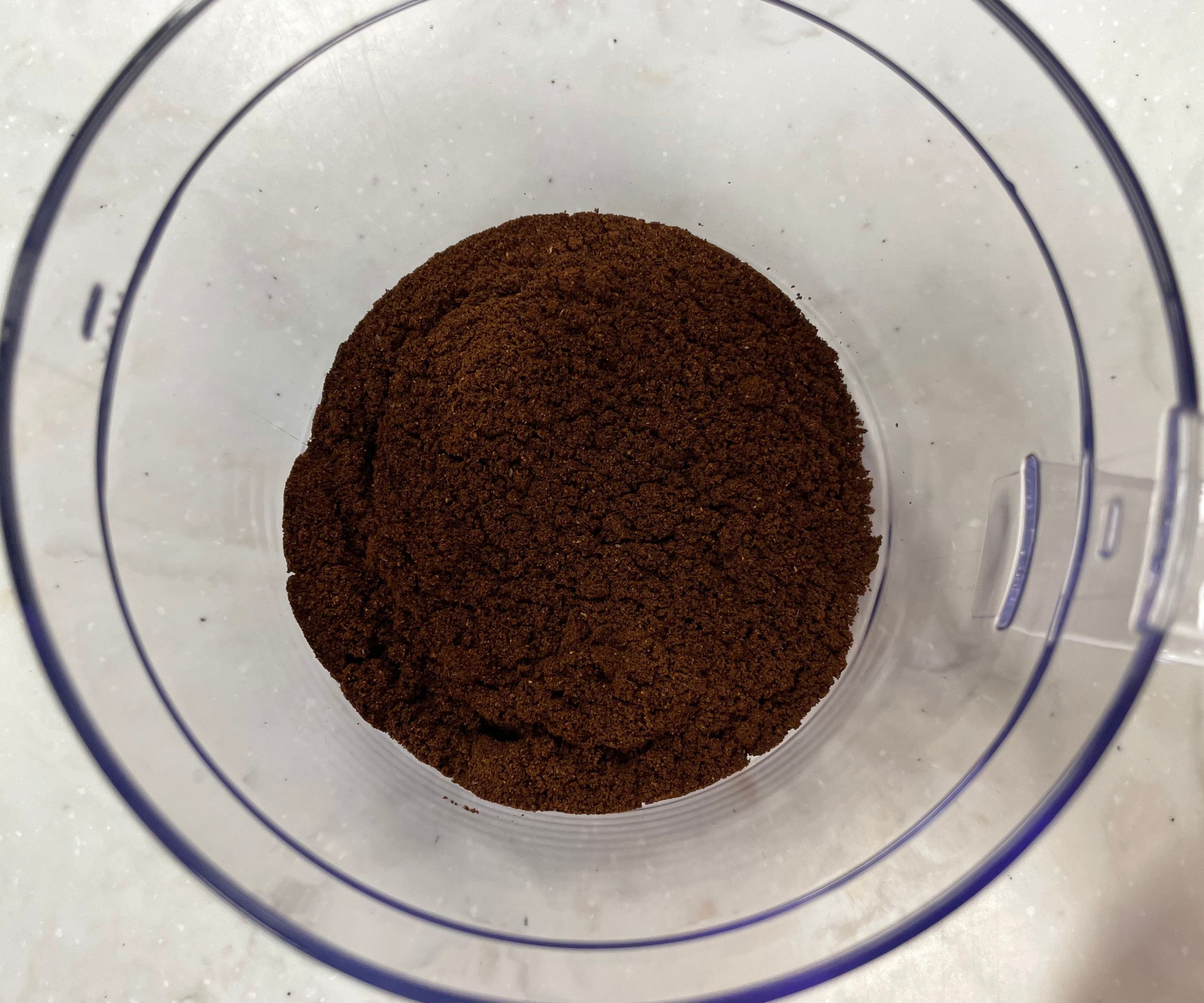
Our first test for every grinder is on the finest setting. I twisted the tactile dial onto its finest number (1) and set the dose to two cups. I watched the timer count down and my beans quickly and relatively quietly whizz away into a powder of coffee grounds.
There was no retention or popcorning and my grinds all looked really consistent. They were the perfect texture for an espresso machine, so I boxed them up and took them back to mine to use, a few hours later, in my home espresso machine. The flavor results were as good as they looked. My espresso was rich and full of deep, complex flavors. Each note of chocolate and hazelnut was sharp and easy to pick out. In summary, it was a great success.
Test 2: Medium grinds
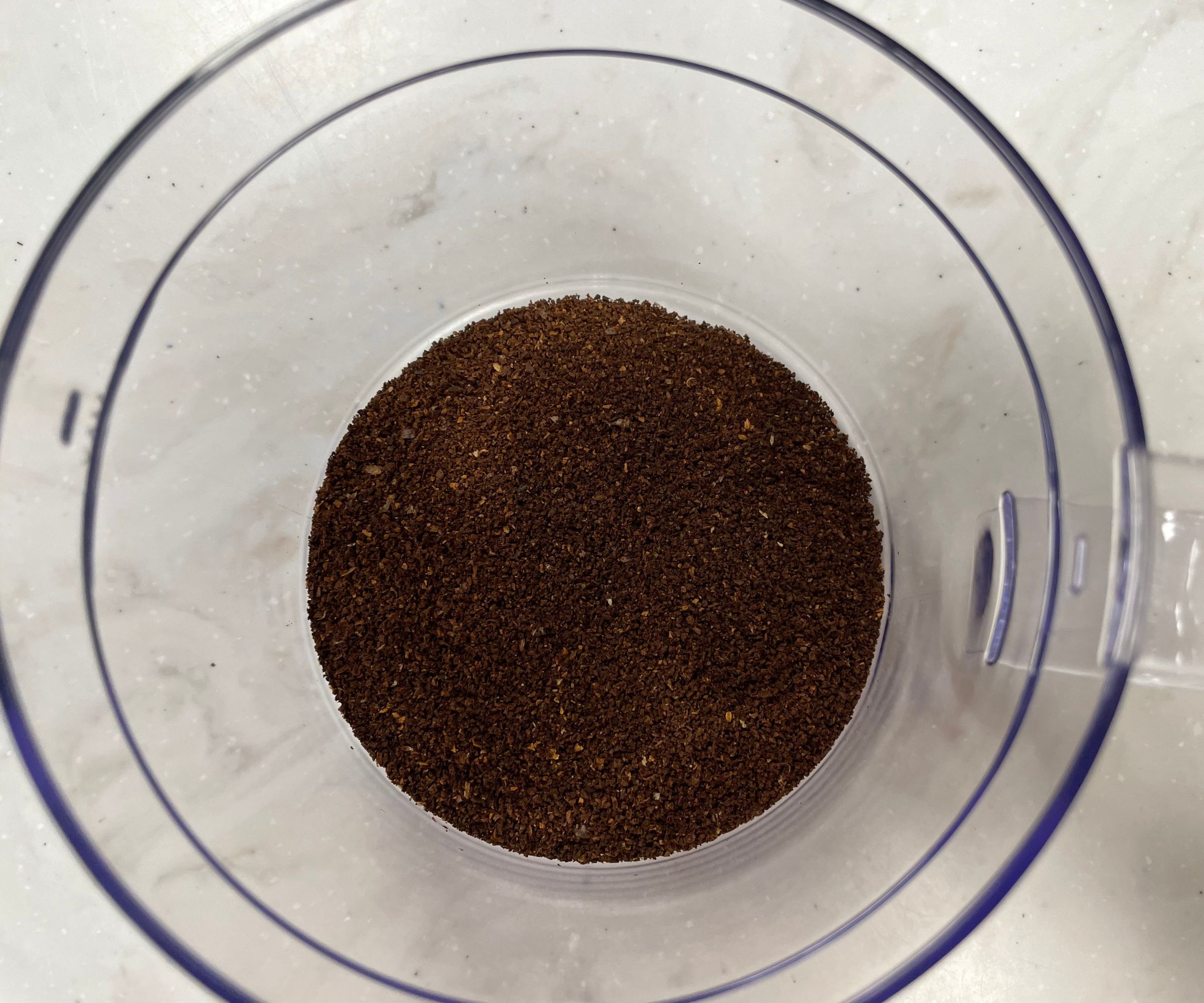
The next test sits in the middle of the KitxhenAid’s grinding range. I twisted the dial to setting 35, keeping the dose to two people, and the KitchenAid automatically adjusted how long it would need to grind through the beans. I let it run and it whizzed through my beans again, dispensing the grounds neatly into the pot without any static.
Again, there was no popcorning or retention and my grounds looked consistent. I sat them against my fine grinds and could see a distinct difference, demonstrating that this really can do it all. The noise level reached 76 dBA of noise, which is pretty noisy but not out of the ordinary for a coffee grinder. Whilst this setting was perhaps on the finer side for French press, I wanted to do a quick taste test, so I brewed a carafe. My cup of coffee was delicious: smooth, even, and delicious. It genuinely very hard to fault this.
Test 3: Coarse grinds
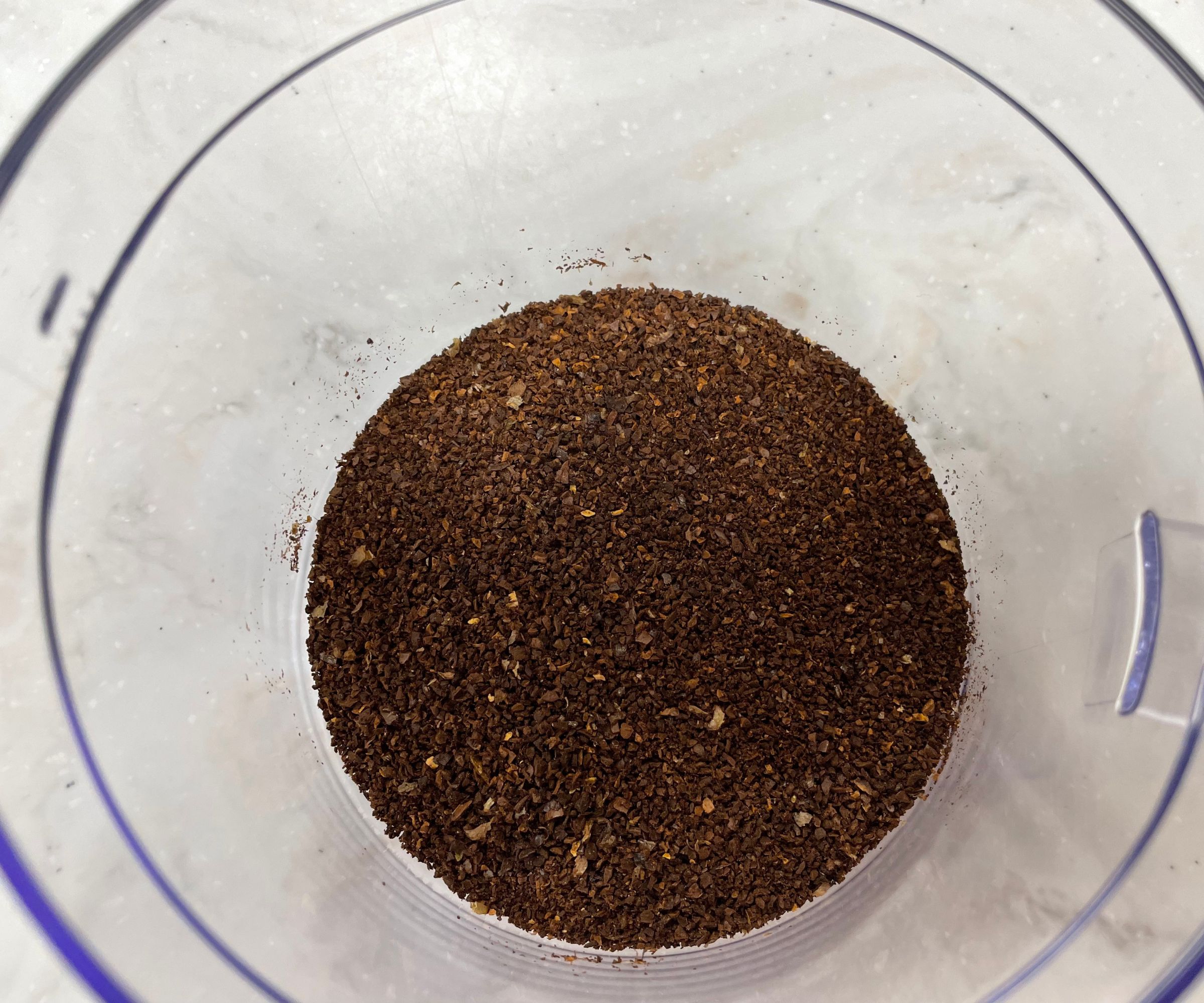
The final test I wanted to put this through was the coarsest setting, so I twisted the grinding dial and it auto-adjusted its timings ready to go. This look the shortest time of all the grinds (just under six seconds), but didn’t create any more noise than the other settings and was still equally consistent.
I put both servings in my French press and brewed up a beautiful carafe of coffee. It was confidently acidic, with clear notes of chocolate and hazelnut extracted from my roast. I’d trust this grinder to do a great job of grinding any beans off any size.
After testing the KitchenAid grinder, I had a couple of filter coffee makers to test, so I thought I would just set the KitchenAid to grind through the rest of the hopper. As expected, it worked through my beans with the efficiency and dexterity that I have come to associate with all of KitchenAid’s coffee products. When it sensed that the bean hopper was empty, this came to an abrupt halt. I then sealed the rubber lid on the grounds container and set it aside for my tests later on. The process couldn’t have been any cleaner and I didn’t even need to watch the KitchenAid grind because all the presets handled everything automatically.
Cleaning, storage, and maintenance
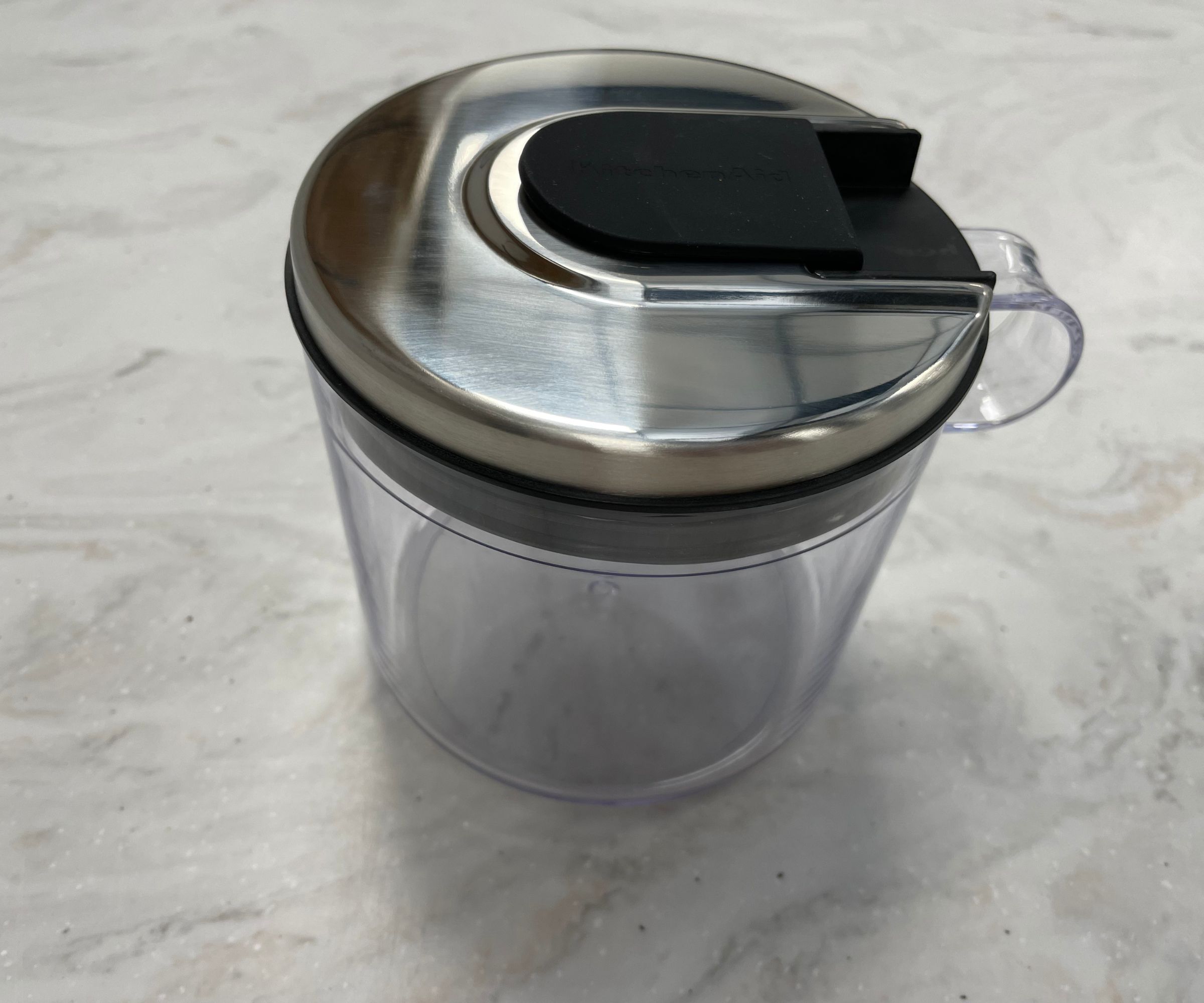
At this point I could look inside the empty burrs to see whether there was any unrecorded grounds retention. Whilst there was a dusting of grounds around the burrs, I couldn’t find enough to weigh out, let alone mention.
All the parts clicked neatly out of place and both the hopper and grounds container can be put in the dishwasher or washed by hand.
As I mentioned, this is bigger than the average coffee grinder, but I also think it’s more beautiful. For both practical and aesthetic reasons, I would recommend finding a spot on your countertop and sitting the KitchenAid there. It would need a tall, stable cupboard to sit inside.
KitchenAid has mitigated the size by offering some storage issues. Inside the base is a neat portafilter holder, which you can lift out and use to grind directly into the filter baskets. You can store it inside the KitchenAid or fixed into the machine.
How does it rate online?
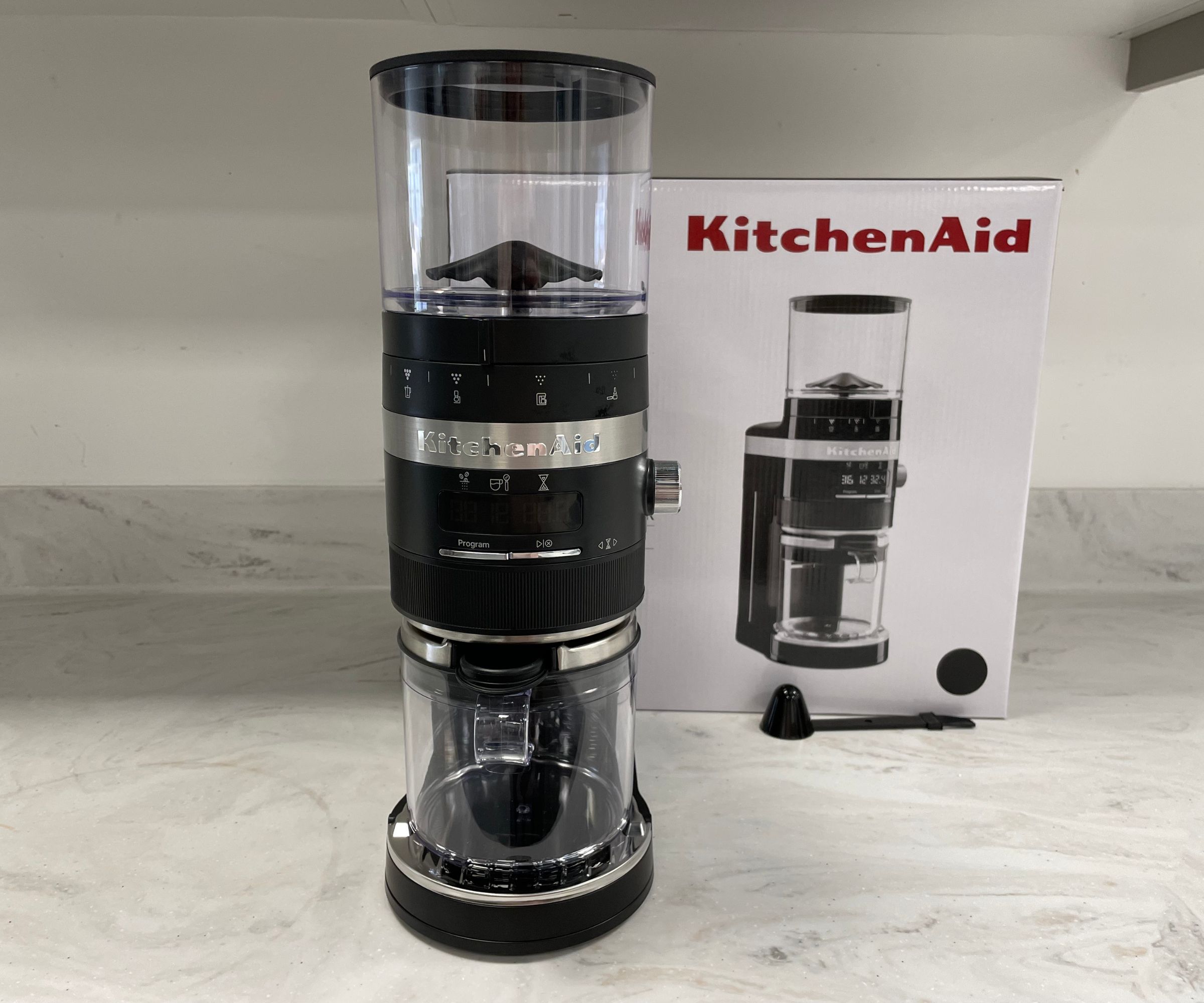
As I said, this is a popular coffee grinder. It’s featured in all the best coffee grinder guides. I’ve seen rave reviews for it from everyone on Reddit, as well as in specialist coffee communities. It’s often recommended to beginners for its easy controls and auto-dosing, but that didn’t stop professionals from praising it too. I spoke with other expert coffee testers who all said they were surprised that KitchenAid, which is are better known for baking, makes such incredible coffee makers.
People only advised that this has all the bells and whistles, so might not be the best investment for entry-level coffee enthusiasts. If you think you might fall out of love with grinding your own beans, this will be a big appliance on your countertop and a big dent in your bank account.
How does it compare?
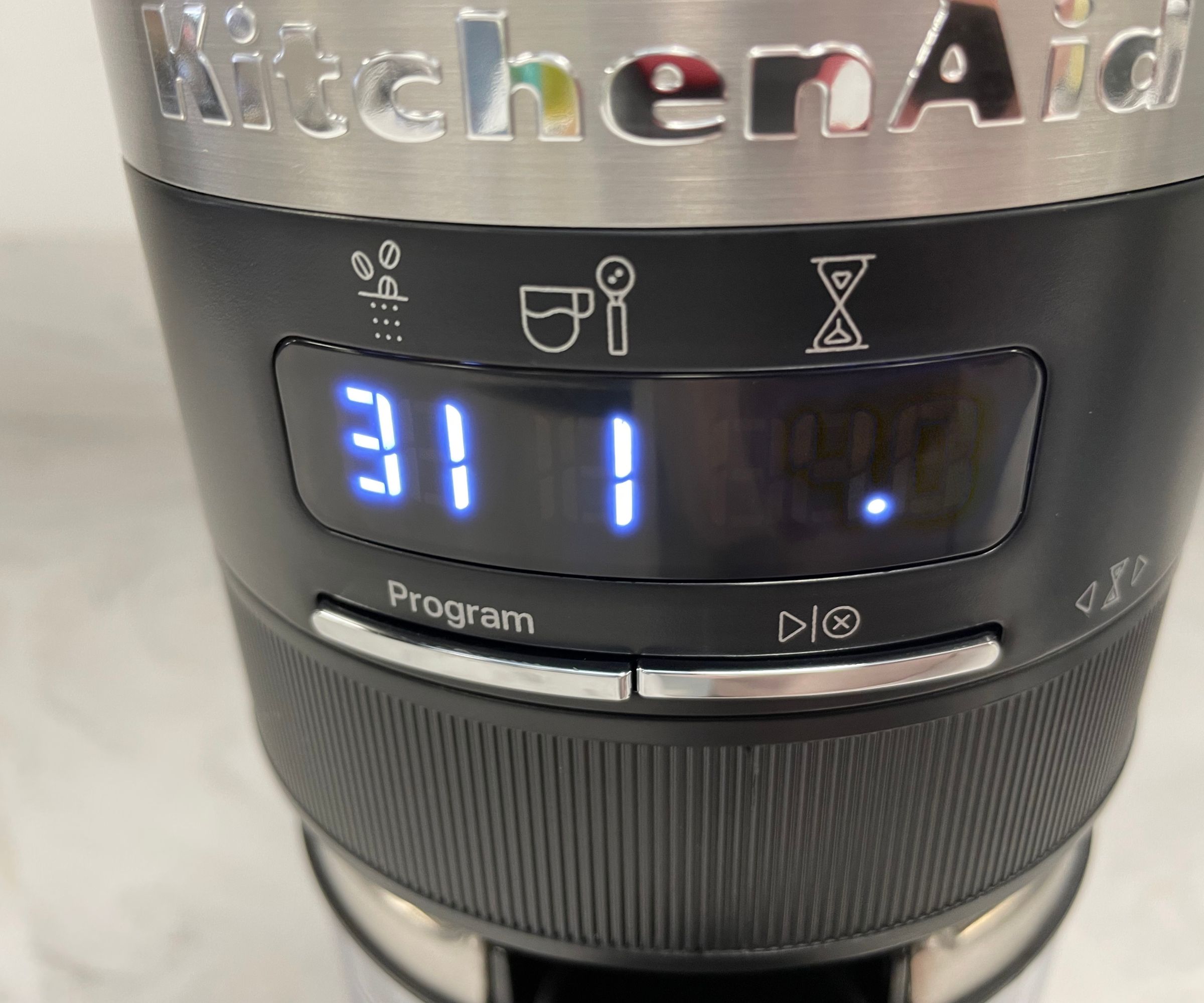
It might seem unfair, but the only comparison I would make to the KitchenAid is the Fellow Ode, available at Amazon, our top pick for the best coffee grinder.
The Fellow Ode also strikes a stunning silhouette on the countertop. The sharp, clean lines are best suited to more modern interiors, but that means that the KitchenAid’s curves suit a cosy, farmhouse style much better. They’re both heavy grinders, so I wouldn’t recommend moving either around much, but the Fellow is much more compact, so will demand a lot less space on your countertop.
Using both machines is easy. The Fellow doesn’t have an LED display or as many increments between settings, so it jumps straight into the deep end. If you’re a beginner, this could be more intimidating, but it’s not difficult to understand. Both grinders share a tactile dial, which makes it easy to switch between settings anyway.
It’s a very close call, but I think the Fellow is slightly more consistent and can grind beans better at the extremes: the fine grinds are exceptional and the coarse grounds are really quite huge. Price wise, there’s not much in it, so really, it’s difficult to choose between the two grinders. I like the fact that you can watch the KitchenAid grind and the controls are really easy to navigate, so I would recommend it for most people, just check the measurements of your countertops and wall cupboards. I think it ultimately comes down to style.
The only person I wouldn’t recommend this for is someone who is on a budget, but who can handle their own grinding. You can use your skills to save some money here and opt for a grinder such as the Bodum Bistro.
Should you buy it?
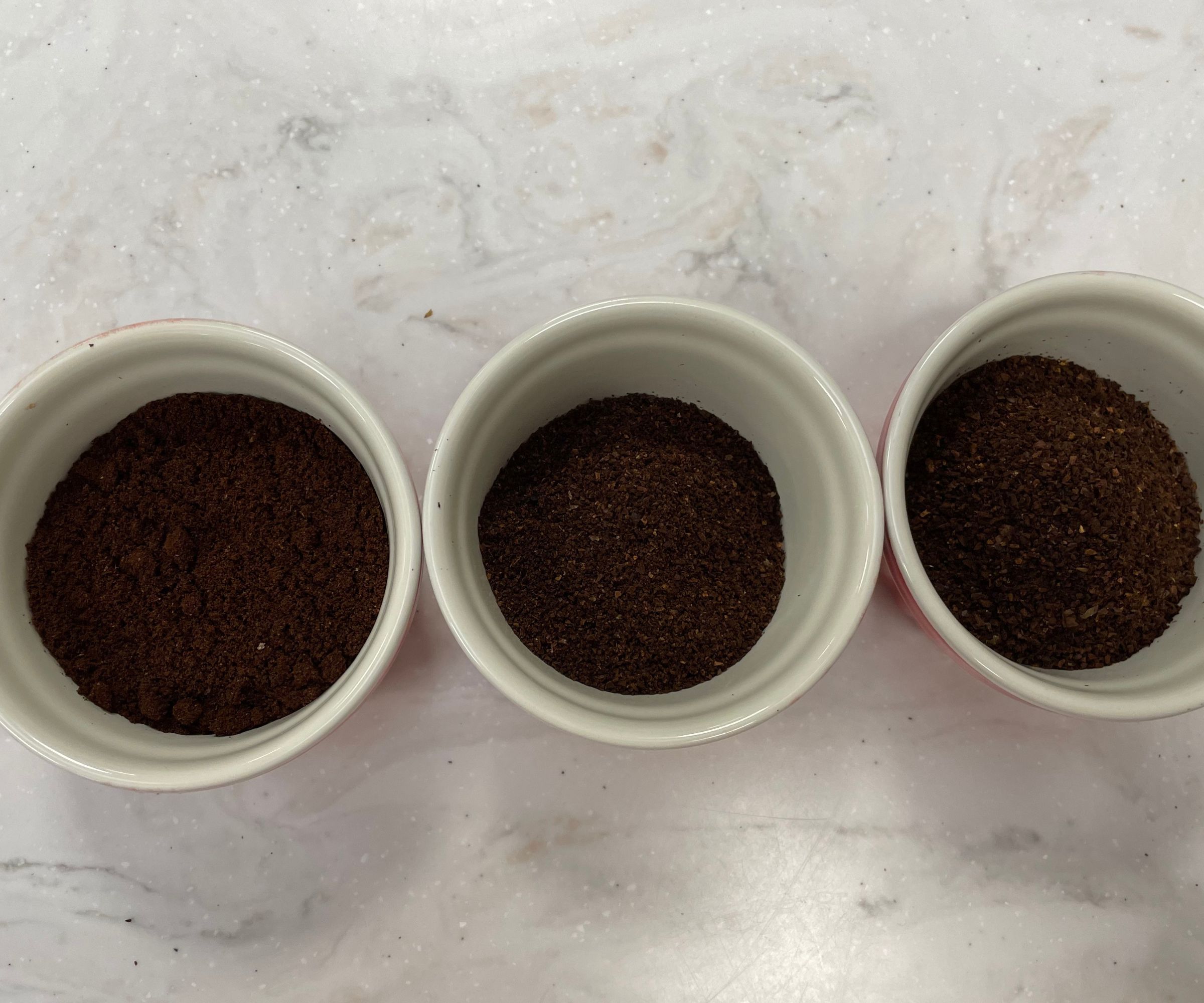
I don’t need any convincing: the KitchenAid is one of the best investments you can make in a grinder. It’s one of the more expensive models on the market, but the build quality is excellent and the controls make it almost impossible to go wrong.
How we test
Before we review or recommend any product to you, we’ve tested it in-person as if it’s an everyday product. We have a specialized process for how we test every appliance. I’m trained as a barista. This means that I’ve been through a number of processes to become an expert on all things coffee.
Before testing, we carefully research the claims that a brand makes about their product, so we know what we are looking for. We will also look at and test competitors, so we can place every product that we test on the market.
I took this KitchenAid grinder and tested it alongside other market-leading grinders. I used it in an everyday kitchen and made sure to test every function. At every stage of the process, from unboxing to cleaning up, I made thorough notes and observations, and taste tested all of the grounds.







